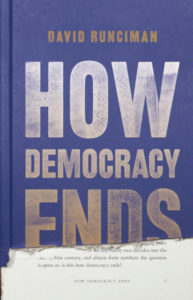 How serious are the challenges to democracy today? One way to assess this is to examine historical experience, using the best global data available. Doing this paints a picture that is less dire than much commentary suggests, according to Daniel Treisman, a professor of political science at the University of California, Los Angeles.
How serious are the challenges to democracy today? One way to assess this is to examine historical experience, using the best global data available. Doing this paints a picture that is less dire than much commentary suggests, according to Daniel Treisman, a professor of political science at the University of California, Los Angeles.
Far from suggesting a major retreat, four ratings used to classify countries’ political systems – Polity; Freedom House; Boix, Miller, Rosato; and VDEM – show the global proportion of democracies at or near an all-time high, he writes for the Washington Post’s Monkey Cage.
To oversimplify, a democracy typically declines like this, the Economist adds:
First, a crisis occurs and voters back a charismatic leader who promises to save them. Second, this leader finds enemies. His aim, in the words of H.L. Mencken, a 20th-century American wit, “is to keep the populace alarmed (and hence clamorous to be led to safety) by an endless series of hobgoblins, all of them imaginary.” Third, he nobbles independent institutions that might get in his way. Finally, he changes the rules to make it harder for voters to dislodge him. During the first three stages, his country is still a democracy. At some point in the final stage, it ceases to be one. All four stages are worth examining.
 In his new book, How Democracy Ends,David Runciman, professor of politics at Cambridge University, considers three types of threat to democracy: coups, catastrophes and technological takeovers, the FT’s Gideon Rachman writes:
In his new book, How Democracy Ends,David Runciman, professor of politics at Cambridge University, considers three types of threat to democracy: coups, catastrophes and technological takeovers, the FT’s Gideon Rachman writes:
- Runciman argues that the classical military coup will become less common. Instead, there will be other forms of “coup”, in which elected governments find their freedom is unexpectedly constrained — even while they remain formally in power. Thus, Greece suffered a military coup in 1967, but, more recently, an elected government simply found itself unable to carry out its promised policies in the face of pressure from the EU, the IMF and international finance, leaving some Greeks fuming about a de facto takeover by international institutions.
- As for catastrophe, Runciman points out that there are many looming threats to civilisation, including environmental crises and nuclear warfare, that could make democracy seem like an unaffordable luxury.
- Finally, there is information technology, which has ensured that “we have become dependent on forms of communication and information-sharing that we neither control or fully understand”. Runciman considers various ways in which technological change could threaten democracy, from the rise of intelligent robots to the threat to freedom of expression in a society in which unpopular statements quickly go viral and destroy careers and livelihoods. RTWT







